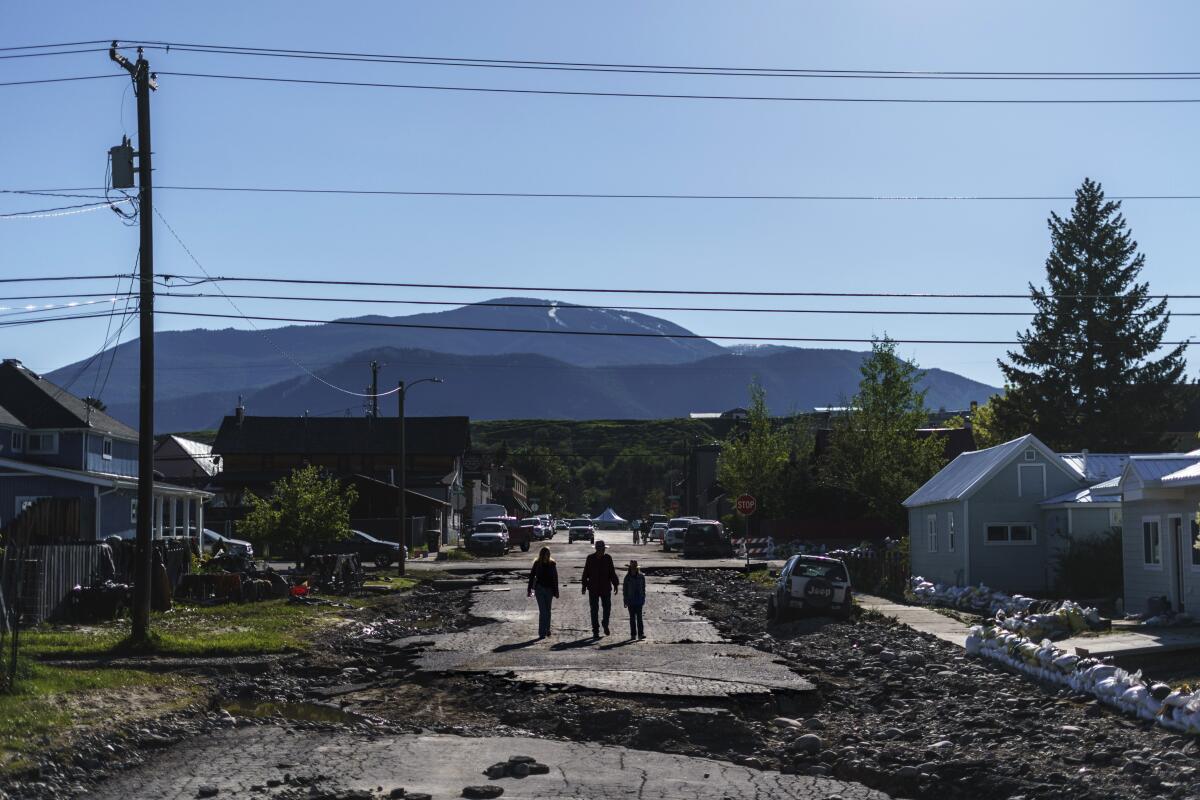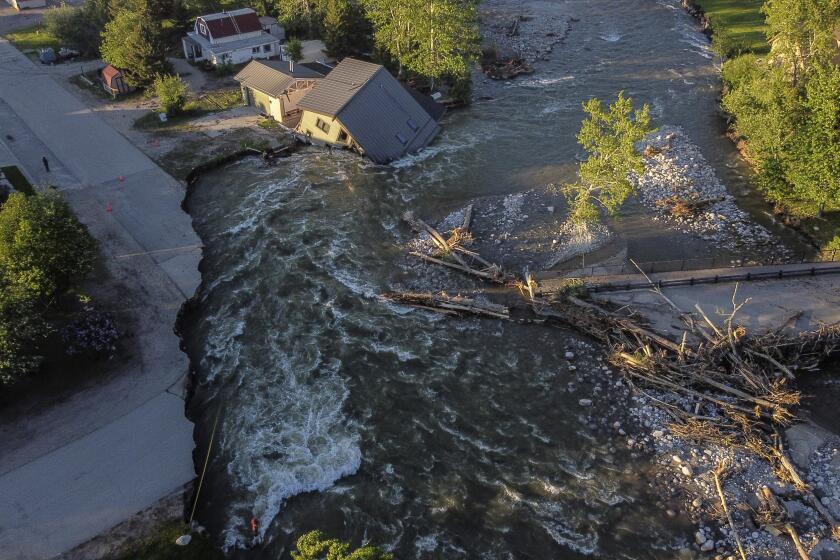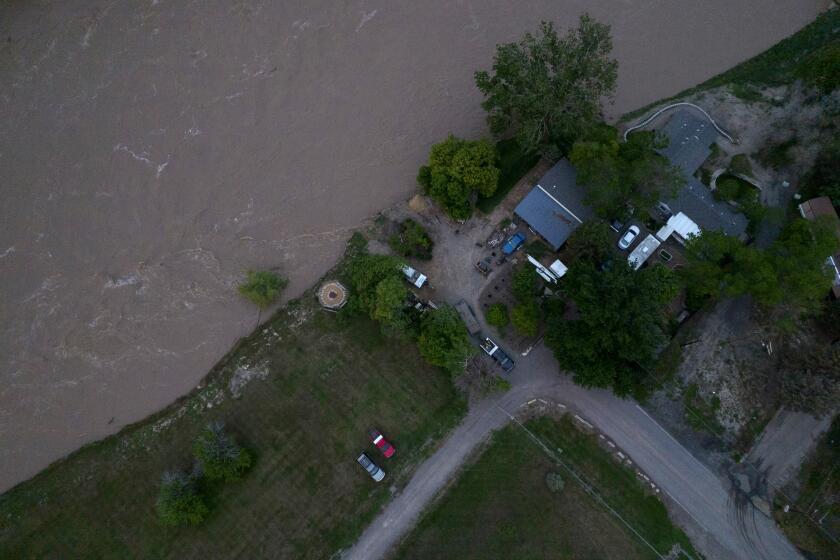Montana governor faces criticism for vacationing during floods

- Share via
RED LODGE, Mont. — Amid heavy criticism six days after leaving the country without telling his constituents, Montana Gov. Greg Gianforte’s office confirmed Friday he had gone to Italy with his wife but was briefed regularly about intense flooding that devastated a large swath of Yellowstone National Park and nearby communities.
The flooding that swept away roads, bridges and homes and shut down Yellowstone, one of America’s most beloved natural attractions and a vital piece of the economy for many nearby towns, began Monday. But it wasn’t until the next day that the Republican governor’s absence was noted, when reporters questioned why a disaster declaration had been signed by the lieutenant governor.
Gianforte’s critics quickly seized on the moment and started the social media hashtag #WhereIsGreg.
With criticism mounting, the governor’s office finally acknowledged Wednesday that he was out of the country on a long-planned personal trip and was working on getting back. Still it wouldn’t say where, citing security concerns.
“In a moment of unprecedented disaster and economic uncertainty, Gianforte purposefully kept Montanans in the dark about where he was, and who was actually in charge,” said Sheila Hogan, executive director of the Montana Democratic Party.
Hogan had asked Tuesday why the governor did not disclose that he was out of the country and that the lieutenant governor was serving as acting governor.
“Truthfully, it speaks for itself. It just does,” said Democratic U.S. Sen. Jon Tester of Montana as he toured flood damage in Red Lodge on Friday. “When you’re in public service there are things that take precedent, and this is pretty important.”
The governor returned to Montana on Thursday night and on Friday spoke publicly for the first time since the flooding in brief remarks. He didn’t address his absence, choosing instead to encourage visitors to still come to the Yellowstone region.
“Here’s a very simple message, for people that have planned trips to Yellowstone Park. We’re open. You’ve got to come. There’s so much to do in Montana. The vitality of our communities depend on it and your families need what we have in Montana. So we’re open for business, we want you to come,” Gianforte said, adding he planned to meet with locals.
Towns like Red Lodge that lead to Yellowstone National Park’s northern entrances and rely on tourists passing through could suffer for the rest of the summer.
Gianforte’s office said he had followed the floods closely while away.
Scott Miller, a commissioner in Carbon County, where flooding heavily damaged the town of Red Lodge and other areas, said Friday that he had been able to contact the governor by phone when he needed to and that the state did not neglect any duties.
“The fact that the governor has been on vacation — there’s been no hiccups,” Miller said. “That’s why you have people in your Cabinet,” to meet the state’s responsibilities.
In Red Lodge, Tester acknowledged he was in Washington this week working on a bill for veterans that passed the Senate on Thursday.
“Some could say, ‘Jon why didn’t you come back Tuesday or Wednesday?’” Tester said. “These are hard situations. I don’t know what his circumstances were. ... I’ve got a decent working relationship with the governor and want to continue that.”
Gianforte’s public appearance Friday was in Gardiner, where a gnawing uncertainty hung over the Yellowstone gateway town that is now cut off from the park.
Gardiner itself escaped the flooding but briefly became home to hundreds of park visitors stranded when the road leading into it was closed along the surging Yellowstone River. When the road reopened, all the tourists left.
“Town is eerie right now,” said Katie Gale, who does booking for a company that offers rafting and other outdoor trips. “We had all those folks trapped in here, and then as soon as they opened the road … it was just like someone just pulled the plug in a bathtub.”
Floodwaters that swept through Yellowstone National Park may have permanently altered the course of a fishing river and forever changed the landscape.
That draining of visitors has become a major concern for businesses in towns that lead to Yellowstone’s northern entrances and rely on tourists passing through.
Officials have said the park’s southern part, whose attractions include the Old Faithful geyser, could reopen as soon as next week. But the north end, which includes Tower Fall and the bears and wolves of Lamar Valley, could stay closed for months after sections of major roads inside the park were washed away or buried in rockfall.
Red Lodge is facing a double disaster: It will have to clean up the damage done by the deluge to parts of town and also figure out how to survive without the summer business that normally sustains it for the rest of the year.
“Winters are hard in Red Lodge,” Chris Prindiville said as he hosed mud from the sidewalk outside his shuttered cafe, which had no fresh water or gas for its stoves. “You have to make your money in the summer so you can make it when the bills keep coming and the visitors have stopped.”
Yellowstone is one of the crown jewels of the park system, a popular summer playground that appeals to adventurous backpackers camping in grizzly country, casual hikers walking past steaming geothermal features and nature lovers gazing at elk, bison, bears and wolves from the safety of their cars.
All 4 million visitors a year have to pass through the small towns that border the park’s five entrances.
The flooding — triggered by a combination of torrential rain and rapid snowmelt — hit just as hotels around Yellowstone were filling up with summer tourists. June is typically one of Yellowstone’s busiest months.
At least 88 people were rescued by the Montana National Guard over the past few days from campsites and small towns, and hundreds of homes, including nearly 150 in Red Lodge, were damaged by high, muddy waters. No deaths or serious injuries have been reported.
Red Lodge remained under a boil-water advisory, and trucks supplied drinking water to the half of the town that was without it. Portable toilets were strategically placed for those who couldn’t flush at home.
The Yodeler Motel, once home to Finnish coal miners, faced its first shutdown since it began operating as a lodge in 1964. Owner Mac Dean said he was going to have to gut the lower level, where 13 rooms flooded in chest-high waters.
Dean had been counting on a busy summer tied to the park’s 150th anniversary. The Yodeler had the most bookings in the 13 years Dean and his wife have owned the business, he said. Now he’s hoping to get some help, possibly from the Federal Emergency Management Agency.
“The damage is catastrophic,” he said. “We’re between a rock and a hard place. And if we don’t get some assistance, we’re not going to make it.”
More to Read
Sign up for Essential California
The most important California stories and recommendations in your inbox every morning.
You may occasionally receive promotional content from the Los Angeles Times.












